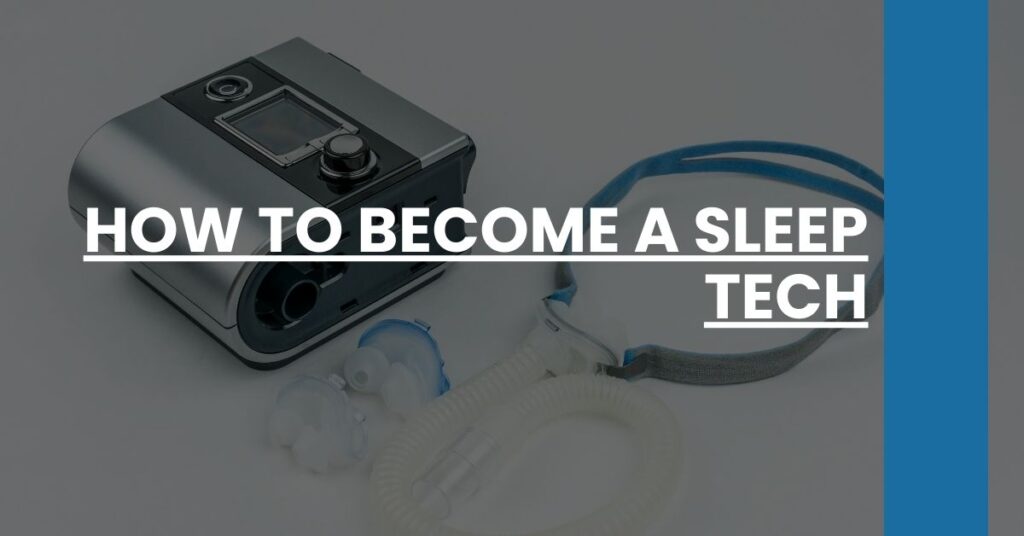Learn how to become a sleep tech in a burgeoning healthcare field focused on enhancing sleep quality for better health.
- Career Advancement: Opportunities for growth in the sleep technology field.
- Certification Process: Navigate the path to becoming a certified sleep technologist.
- Industry Overview: Understand the demand and prospects for sleep techs in healthcare.
Start your journey today to become a sleep tech and unlock a future of possibilities.
- Understanding the Role of a Sleep Tech
- Educational Pathways to Becoming a Sleep Tech
- Required Certifications for Sleep Techs
- Gaining Relevant Experience
- Navigating the Job Market for Sleep Techs
- Ongoing Education and Professional Development
- Essential Skills and Qualities of a Successful Sleep Tech
- Learn From the Experts: Networking and Mentorship
- Legal and Ethical Considerations in Sleep Technology
- Conclusion: Embarking on Your Sleep Tech Journey
Understanding the Role of a Sleep Tech
Sleep techs, or polysomnographic technologists, are the unsung heroes in the medical community, dedicated to the study of sleep patterns and disorders. As a sleep tech, you’d play a vital role in diagnosing conditions such as sleep apnea, insomnia, narcolepsy, and restless leg syndrome which affect millions of people worldwide.
What Does a Sleep Tech Do?
Job Responsibilities:
- Conduct sleep studies, also known as polysomnograms, to monitor patients as they sleep.
- Set up and maintain sleep study equipment.
- Collect and analyze biological specimens according to prescribed standards.
- Assist in the treatment of sleep disorders, such as continuous positive airway pressure (CPAP) therapy.
- Educate patients about their condition and the necessary lifestyle changes.
Why Is This Role Important?
Your work as a sleep tech can significantly improve patients’ quality of life. With your expertise, you can help bring restful nights back to those plagued by chronic sleep issues, contributing to their overall well-being and health.
Educational Pathways to Becoming a Sleep Tech
The journey of how to become a sleep tech often begins with post-secondary education. Most employers require at least an associate degree in polysomnography or a related field. Occasionally, a bachelor’s degree could give you a competitive edge, opening up opportunities for advancement.
Degrees and Programs:
- Associate Degree in Polysomnography: This typically two-year program provides foundational knowledge in sleep technology.
- Bachelor’s Degree in Allied Health: With a focus on sleep studies, this four-year degree can offer broader knowledge in the healthcare field.
- Certification Programs: Some institutions offer certification programs specifically tailored to sleep technology.
To ensure the program’s credibility and your future qualifications, opt for one accredited by the Commission on Accreditation of Allied Health Education Programs (CAAHEP).
Accredited Sleep Technologist Education Program – find a program to begin your educational journey.
Required Certifications for Sleep Techs
To practice as a registered sleep technologist, you will need to undergo certification to attest to your skills and knowledge in the field. The Board of Registered Polysomnographic Technologists (BRPT) is a widely recognized certifying body.
- Registered Polysomnographic Technologist (RPSGT): This is a gold-standard certification in the field of sleep technology.
- Certified Polysomnographic Technician (CPSGT): An entry-level credential that acts as a stepping stone to becoming an RPSGT.
- Certification in Clinical Sleep Health (CCSH): For more advanced career opportunities within sleep medicine.
You can maintain your certification and stay updated with the latest advancements in sleep technology through Continuing Sleep Technology Education (CSTE) credits.
BRPT’s Certification Overview – explore the different certifications available.
Gaining Relevant Experience
Your academic qualifications are just the beginning; hands-on experience is crucial. Employers often look for candidates who have completed clinical practicums or internships.
Key Ways to Gain Experience:
- Internship Programs: Engage in internships during or after your studies to get practical experience.
- Clinical Practicums: These are typically part of your education program and provide direct experience with patient care and equipment.
Remember that experience is not only about the hours logged but also about the expertise gained, so approach each practical opportunity as a stepping stone towards your dream career.
Navigating the Job Market for Sleep Techs
The job market for sleep techs is evolving. With the increased prevalence of sleep disorders, your role is becoming ever more crucial in healthcare.
Where to Look for Jobs:
- Hospitals: They often have their own sleep clinics and laboratories.
- Independent Sleep Centers: These establishments are entirely focused on sleep disorders.
- Home Health Services: Growing trends in home sleep apnea testing offer jobs outside of traditional sleep labs.
Stay connected to industry news to understand where growth is happening and align your job search accordingly.
Stay up to date with Job Prospects in Sleep Technology – learn about job opportunities and industry growth areas.
Ongoing Education and Professional Development
As with many roles in the healthcare sector, your education doesn’t end when you become a sleep tech. Continuous learning is essential to keep pace with new technologies, treatments, and best practices in sleep medicine.
- Stay Current: Advances in sleep technology happen frequently, and it’s important to stay informed.
- Maintain Certification: Most certifications require you to earn Continuing Education (CE) credits to keep your credential active.
- Professional Memberships: Join organizations such as AASM or AAST that offer a plethora of resources, including CME courses, A-STEP programs, and modules for sleep technologists.
Consider ongoing education as an investment in your career. By doing so, you are not only improving your own skills, but also adding value to the healthcare system by improving patient outcomes.
Essential Skills and Qualities of a Successful Sleep Tech
To flourish in the field of sleep technology, you’ll need a blend of technical prowess and soft skills. Here’s what can set you apart:
Technical Skills:
- In-depth knowledge of polysomnographic procedures and equipment.
- Proficiency in data analysis and interpretation.
Soft Skills:
- Empathy: Understanding your patients’ needs and concerns.
- Attention to Detail: Inaccuracies can lead to misdiagnosis; precision is key.
- Communication Skills: You’ll need to explain complex information in simple terms to patients.
- Resilience: Working night shifts and dealing with demanding situations requires physical and emotional stamina.
By nurturing these skills, you align yourself with the best in the field, driving better health outcomes and patient satisfaction.
Learn From the Experts: Networking and Mentorship
Building a network of peers and mentors is invaluable. It can lead to job opportunities, professional development, and personal growth.
Networking Opportunities:
- Attend industry conferences to meet thought leaders and peers.
- Participate in online forums or social media groups focused on sleep technology.
Seeking Mentorship:
- Identify a Mentor: Look for someone whose career path resonates with you.
- Formal Programs: Some professional associations offer mentorship programs for budding sleep techs.
Connections can open doors that qualifications alone cannot, and the knowledge shared through these relationships can be an instrumental part of how to become a sleep tech.
Legal and Ethical Considerations in Sleep Technology
Working within the healthcare realm entails a strict adherence to ethical and legal standards to protect both the patient and the professional.
- Patient Confidentiality: Safeguarding personal health information.
- Informed Consent: Ensuring patients understand the procedures they undergo.
- Professional Conduct: Upholding the standards set by regulatory bodies ensures trust and safety in sleep technology practices.
Being mindful of these considerations reinforces professionalism and contributes to the esteemed reputation of the field.
Conclusion: Embarking on Your Sleep Tech Journey
By now, you have a thorough understanding of the dedication, learning, and personal growth that goes into becoming a sleep tech. The journey is filled with continuous education, hands-on experience, and an uncompromising commitment to ethical standards. Whether you’re starting with your educational pathway or looking to expand your professional network, remember that every step you take brings you closer to a rewarding career in sleep technology. Your future as a sleep tech beckons – shine brightly and help others rest well.

